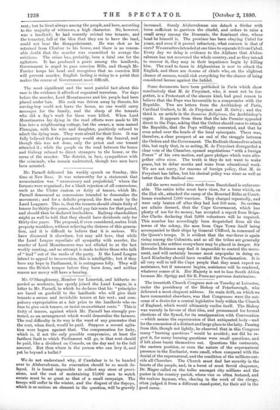Some documents have been published in Paris which show conclusively
that M. de Freycinet, who, it must not be for- gotten, is a Protestant of the sincere kind, had good reason to believe that the Pope was favourable to a compromise with the Republic. Two are letters from the Archbishop of Paris, Cardinal Guibert, to M. de Freycinet and M. Grevy ; and the third is an article in the Semaine Beligieuse, the Archbishop's organ. It appears from them that the late Premier appealed direct to the Pope, asking that the Orders should cease to attack the Republic, that the Pope willingly consented, and that he even acted over the heads of the local episcopate. There was, therefore, a clear prospect of an end of the struggle between the Orders and the Government. The Radicals themselves admit this, but reply that, in so acting, M. de Freycinet disregarded a clear vote of the Chamber, opened negotiations "with a foreign Power" of his own motion, and gave pledges which were alto- gether ultra vires. The truth is they do not want to make peace, but to debar monks and nuns from educational work. We are not sorry, for reasons of foreign policy, that M. de Freycinet has fallen, but his clerical policy was wiser as well as better than the Radical one.


































 Previous page
Previous page